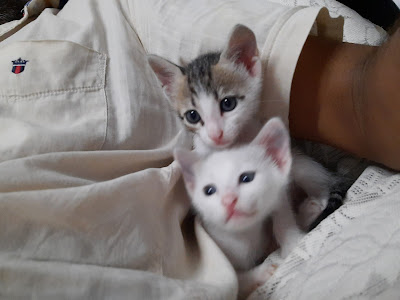Maxima and Minima
 |
| Close to my heart |
Small things can make me indecently
happy or sad. An old friend once compared my mood swings to the maxima-minima
graph of a mathematical function. “You are either on the top or at the bottom,”
he said like a concerned friend. That was long ago, some time in the 80s. Four
decades later, I still remain the same. Painfully aware of the maxima and
minima of my mood swings. Helplessly aware. Because they are not under my
control. Some things are in your blood. You have to live with them.
A friend of
Maggie had arranged the adoption of one of my kittens two days back. Today she
told Maggie that the kitten was only crying all the time without eating or
drinking anything. That was enough for my mood to hit the bottom. “Tell her to
return the kitten immediately,” I told Maggie. “I’ll pick it up from their
place.” I couldn’t bear the thought of that little creature wandering around
looking for its mother and siblings crying all the while. Maggie knows when I’m serious. A few phone
conversations later, we learnt that the kitten took a day to adapt to its new situation.
But after that, it was doing fine. Maggie’s friend was not told about the
latter part. Good news doesn’t travel as fast as the bad.
A few weeks
back another kitten was being adopted. I was asked to deliver it at a
particular place near my school. Having handed it over, Maggie and I sat in our
car and watched the person ride her scooter with the kitten. A minute later,
the scooter stopped. The kitten managed to escape from its box somehow and it
started running on the road. I drove instantly and instinctively to the spot,
stopped my car, came out and went after the tiny creature calling it. It
stopped running and turned to me. I picked it up and held it close to my heart.
It remained there snuggling in my arms. Close to my heart. A day later, I was
told that the kitten had become the darling of its entire new family. Close to
their heart. My mood wave hit another maximum.
I was never fond of animals until a kitten walked into my life from nowhere. It was an abandoned kitten. People abandoning kittens on roadsides is quite common around here. What moved me was the kitten’s helplessness. Is it pity or love that I feel? I try to rationalise it as pity towards the helplessness of a tiny, innocent creature. But my heart seems to tell me something else. I am yet to comprehend the waywardness of my heart. Maybe, that’s why the graph hits so many maxima and minima.
PS. I must express my infinite gratitude to Maggie's friend who has helped us with the adoption of many of our kittens. Thank you, D.
Hari OM
ReplyDeleteThe doctor in my wonders if you have ever been offered assessment; such erratic and defined swings speaks strongly to some bipolar tendency. It is not abnormal to feel compassion for pets - but this sounds extreme... That all said, I am pleased that you are able to find homes for kittens... then the medic in me again wonders at your not having the mother cat/s neutered and thus preventing any further endangerment to your heart?!! (Forgive this pragmatist...) YAM xx
There is borderline bipolar disorder, I know. Since it's not hazardous to anyone, i let it be with occasional medication...
DeleteThere is no neutering of cats here, as far as I know. I had enquired.
A heart-warming experience and adorable kittens! :)
ReplyDeletePets do bring in a unique joy.
DeleteLoved reading it sir. Wish you, mam and your kittens great health.
ReplyDeleteThank you, Abhishek.
DeleteWe get attached to pets and it's quite natural that our moods are influenced by them.
ReplyDeleteNice of you to have arranged for the adoption of the kittens.
Online games and the idea of beauty
I had little choice but get people to adopt them because at a time there were 8 of them at home excluding adult cats. I'm grateful to so many people who gladly took the kittens.
Deleteso sweet! nice read.
ReplyDelete